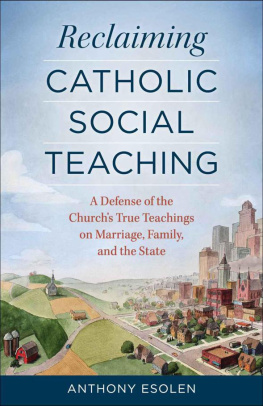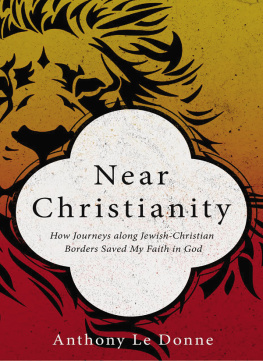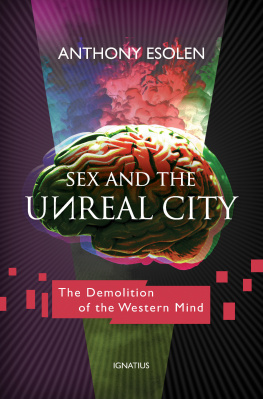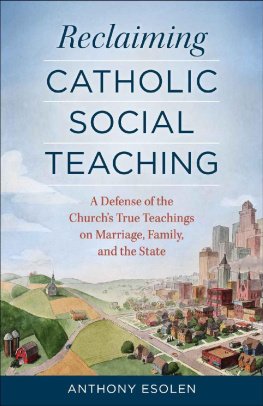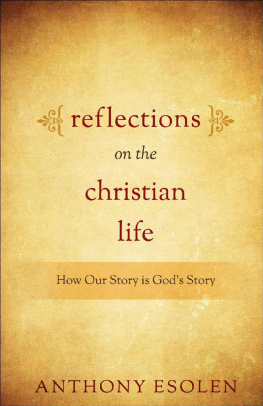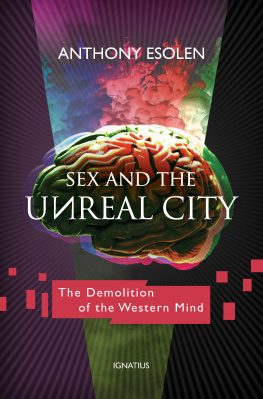Ironies of Faith
The Laughter at the Heart of Christian Literature
Anthony Esolen
ISI Books
Wilmington, Delaware
2007
Contents
D EDICATION
For Rodney Delasanta (19322007)
Teacher, Colleague, and Friend
Now I send thee, to open their eyes,
and to turn them from darkness to light.
Preface
But all human efforts, all the lavish gifts of the emperor, and the propitiations of the gods, did not banish the sinister belief that the conflagration was the result of an order. Consequently, to get rid of the report, Nero fastened the guilt and inflicted the most exquisite tortures on a class hated for their abominations, called Christians by the populace. Christus, from whom the name had its origin, suffered the extreme penalty during the reign of Tiberius at the hands of one of our procurators, Pontius Pilatus, and a most mischievous superstition, thus checked for the moment, again broke out not only in Judaea, the first source of the evil, but even in Rome, where all things hideous and shameful from every part of the world find their center and become popular. Accordingly, an arrest was first made of all who pleaded guilty; then, upon their information, an immense multitude was convicted, not so much of the crime of firing the city, as of hatred against mankind.
Tacitus, Annals 15.44
H ow pleasant it is to forgive the errors of historians. Here we have Tacitus, the great chronicler of decadence among the Roman aristocracy of the first century. He is explaining how the tyrant Nero deflected suspicion from himself by blaming the Christians in Rome not merely for setting the city on fire, but for perfect monstrosityhatred against mankind. Tacitus sees the technical injustice of the charge, but does not shed a tear for the Christians, whose abominations (Christians were typically accused of cannibalism) deserve no compassion. Nor do they stir his curiosity. They are footnotes in his epic account of Roman history.
Tacitus could not know that that small sect, whose beliefs were other than what he supposed, would survive to overcome the Romans, and that two thousand years later, Christianity would be the dominant religious and cultural force in the world, while his pagan Rome would be no more. With the assistance of Tacitus himself, Nero would become the imbecilic emblem of all that was ignoble and debased in the great city; while the chief Christians whom Nero executed, Peter and Paul, would be revered as saints. Needless to say, the otherwise clear-sighted Tacitus could not see exactly what was going on. He was but a man of his day.
What of the men of our day? Can they see Christianity any the more clearly? Tacituss mistake was born of unfamiliarity; ours are born of overfamiliarity. We are like people who live in the shadow of a great and rugged mountain, who never notice how it alters even the light of the day, from the rising to the setting sun.
Specifically, many people who teach and write about European literature do not understand the heart of Christianity. That is a problemas great as if one attempted to discuss the poetry of Islam, without knowing what it was like, from the heart, to be a Muslim. It is compounded by the pervasiveness of Christian images and ideas in our culture. They give one a self-deceptive ease in talking about Christianity. Then, when the faith proves more subtle than ones caricature, that same overfamiliarity tempts one to patter about contradictions and tensions. The critic sees holes where there are but spaces in a most intricate lacework.
Along with overfamiliarity steals a weariness of the intellect and the imagination. Man abhors an empty altar. He longs to lay his will at the feet of one worthy to be obeyed. But when he detaches himself from the ground of his being, and when his idols prove to be the cheats of his own fancy, he retires into skepticism. Henryk Sienkiewicz captures the mood in the first sentence of his epic Quo Vadis? He reveals the lassitude of a world deprived of the wonder of worship: Petronius woke only about midday and as usual greatly wearied. The master of Neros games requires the ministrations of bath attendants, slaves all, to rouse his slothful blood and quicken him, as if he had risen from the dead. But Petronius has not risen from the dead, and is not yet suited to see the One who has. For now, when he hears of a certain Paul preaching the resurrection, he smiles, as if he had heard it all before.
Whether a book like this can win a hearing from our contemporary Petronii and Petroniae who teach literature, I cannot tell. But I have a more important motive. Esteeming the experts too highly, many Christians have abandoned their literature to the mainly secular scholars that inhabit our universities. But Shakespeare, Herbert, Dickens, and Hopkins did not write for scholars in universities. What would have been the point? For the sake of the literature itself, meant to be loved by anyone who could read or attend a play, Christians should reclaim their heritage. This book is written to assist them in their quest.
Finally, I am writing to meditate upon the mysteries of the Christian faith. I have chosen irony as my organizing principle, partly because the subject interests me, and partly because it is often assumed that irony and faith are incompatible. Irony corrodes any stable supposition of truth, say some; but I think it is rather skepticism that corrodes the possibilities for irony. I do not think that irony must lead to nihilism. If one examines the evidence of Christian literature, one might conclude quite the opposite: that the richest irony presupposes truth and order. Be that as it may, in this book I hope to save irony from its worst friends. In doing so, I pray that I may be touched by the Christian mysteries of incarnation and transcendence, free will and design, sin and redemption, blindness and vision, freedom and submission, and, most of all, the subtle strand that links human love to the love that moves the sun and the other stars.
Part One
Humility & Vision
To Be Pompilia, Not the Fisc:Browning and the Irony of Humility
B efore I define what irony is, let us examine what habits of mind are necessary for understanding so subtle a feature of language. Those habits are all the more necessary as the language of Christendom grows more distant and the culture more foreign.
Cleverness is not the answer. I would like to illustrate why by turning to a masterpiece of Christian poetry. Robert Browning wrote his longest and most difficult work, The Ring and the Book, precisely to show human beings failing to interpret correctly the actions and motives of one another. They fail not because they are dim-witted, but because their moral compromises limit their vision. Prideand its concomitant assumption that everyone must be just like oneself, only not quite so intelligent or strong-willedis the problem.
Browning derives his plot from the account of a notorious series of trials in late-seventeenth-century Rome. Violante, a childless wife, finds a woman of the streets who has recently given birth to a girl. She pays her for the baby and passes it off to her husband Pietro as their own. They christen her Pompilia, and together they live well enough for people with no hereditary title. Worried that the secret of the birth will come out, Violante seeks to marry Pompilia away as soon as she can to someone with the title they lack. She finds one Guido, an Aretine and hanger-on at the cardinals court, no priest but enough of a cleric to claim ecclesiastical privilege. He is a short, middle-aged, cowardly, ugly, embittered, and poverty-stricken aristocrat. The marriage is a hugger-mugger affair, Pietro not even present. Guido expects a large dowry; Pietro imagines the wealth of Guidos ancestral home. When that castle in Arezzo proves dilapidated and cold, and when Guido treats the parents with brute tyranny, they flee to their old home in Rome, leaving Pompilia behind.
Next page


